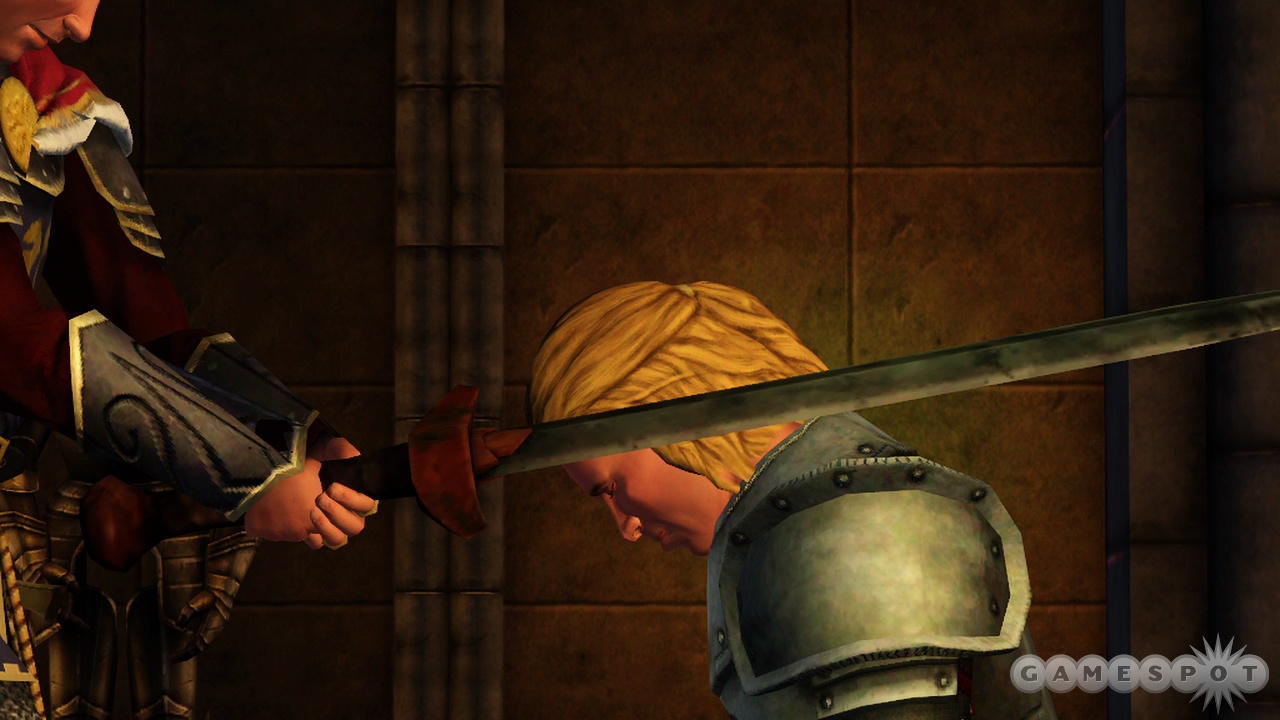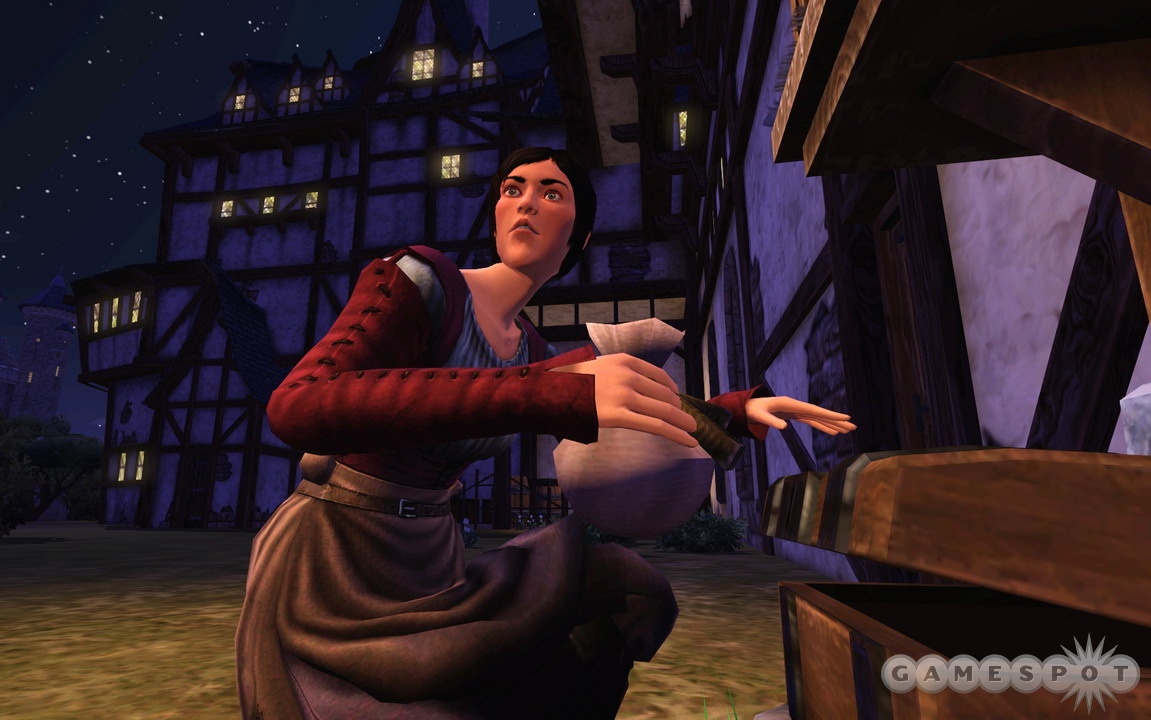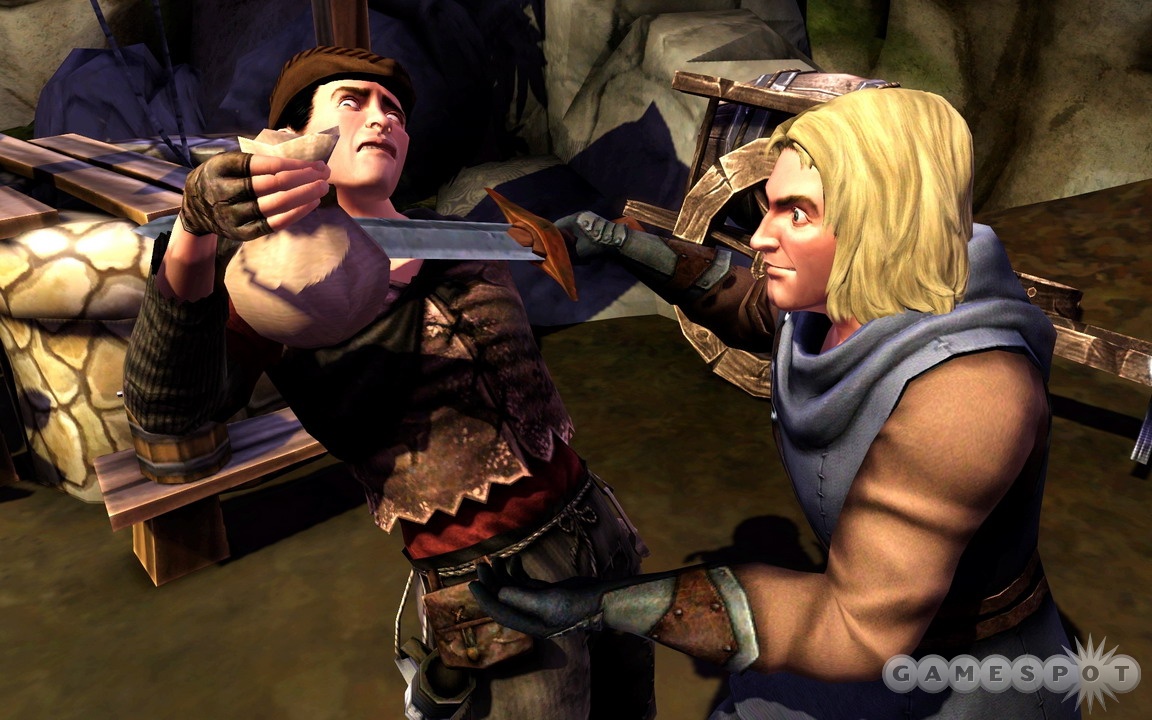The Sims Medieval Impressions - First Details
Hear ye! The next Sims game for the PC will not be The Sims 4. Nay, good lords and ladies. Twill be a tale of nobles and peasants. Who talk funny. Attain the first details here!
While EA's The Sims series has seen amazing success on the PC as a continuously successful series that, every few years, gives rise to a sequel and then a bunch of expansion packs, EA's Play division, which is responsible for the Sims games, is going in a brand-new direction. Specifically, it's going backward in time to the days of old when knights were bold and modern medical technology amounted to a jar full of leeches (and really cutting-edge medical technology was a second jar of leeches). Yes, rather than purchasing a house in the suburbs outside of SimCity, in The Sims Medieval, you'll have all your little computer people living in and around a castle. And rather than play as your little virtual family members throughout the course of their entire lives until they have children of their own who eventually grow into a new generation of parents (and so on and so forth), in Medieval, you'll instead play through a single story arc with your characters and be assigned an overall score once you've completed enough of their quests, bringing your game session to an end.
Sound different from what you're used to with The Sims? It is. While there's a lot of The Sims 3's technology under the hood powering Medieval, this is a fundamentally different game that's focused less on open-ended designing and building and more on story-driven, quest-driven experiences. The game even looks different. Rather than going with the usual bright, sunny, colorful look of The Sims, Medieval has a subdued color palette and an aesthetic that the team describes as "painterly" and "illustrative," which recalls the classic artwork of Renaissance-era Europe. We watched a brief, hands-off demonstration of the game and didn't even see a single mention of any llamas anywhere (but then again, this was an early, work-in-progress version of the game, so everything in this report is subject to change).

Our demonstration started with a flythrough of a medieval city built around a majestic castle, flanked by cathedrals, gallows, and guildhouses. When starting a new game session of Medieval, you'll choose a large-scale kingdom ambition (which effectively replaces the life ambitions of The Sims 3) that applies to your entire kingdom. And you'll use the strengths of various hero characters to complete quests that earn points toward this goal, including venturing forth to slay dragons or marrying off a princess to strengthen ties with a neighboring country. However, there will be other, subtler social dynamics at work in the world of Medieval, such as class strife between lowly peasants and haughty nobles, as well as conflict between two competing religious orders. One of these conflicts attempts to gently appeal to the hearts and minds of the local citizenry; the other attempts to gain influence through fear and intimidation. (And the god that each religious order worships is none other than…wait for it…wait for it…you!).
In Medieval, you don't necessarily switch control from one character to another and then another; instead, you will control a primary character by accepting an outstanding quest for that character (and if you wish to keep playing that character, then you can simply keep accepting quests for that character). One of the many heroes you can choose to follow as your active character is the realm's king or queen, who resides in the castle, which itself can be edited and designed…somewhat. To keep the game's look and feel consistent, your view of the castle in build mode won't cut away all the walls; instead, it will give you cross-sectional views that encompass the entire room at a glance.

Also, while you will be able to purchase and place period-piece furniture in different castle rooms; make additions to certain parts of the castle's layout, such as secret chambers beneath the castle to house spies; and even do some limited color editing, there won't be any neon-colored, leopard-print patterns for you to make a glam-rock version of Camelot. Besides, the castle will be a busy place because it will not only be the site of important matters of state (such as royal decrees and dramatic, Macbeth-esque duels), but also the living quarters of king and court. Back in the days of yore, courtiers didn't see to their affairs and then call a taxi to drive them across town back to their split-level apartments afterward. Instead, they held court with the king and then retired to their chambers upstairs. Living and working in Medieval will be a much more intimate experience, at least for the royal family and its associated nobles.
In the demonstration we watched, the king character was already holding court with two of his best knights, discussing an upcoming tournament before dismissing one of his subjects. The remaining knight challenged the king to a duel, and after each man dramatically threatened the other in scary-sounding simlish (yes, in Medieval, all characters still speak in gibberish), they drew their weapons and sparred. Each man gradually made progress along his respective swordfighting skill bar, which hovered above each character's head. Alack, the king was struck down in this skirmish and afflicted henceforth with an illness that would require a quest to cure, though both characters gained experience points, which go toward gaining full-on experience levels that make characters more competent at their professions (such as swordfighting, in the case of a knight hero, or bloodletting, in the case of a medieval physician hero).

While we'll get to medieval medicine in a bit (and there will be wacky torture-rack-looking equipment along with a cavalcade of leeches), at this point in our demonstration, we briefly jumped away from the king's quest to Medieval's create-a-sim, which will be subtly different from that of The Sims 3. The most obvious change will be your character's clothing choices, which will include an array of winsome dresses and modest frocks for female sims and various tunics and breeches for male sims (knights and rulers may be of either gender, so both female and male sims may wear armor and a sword or a crown and robes).
However, this time around, the faces in create-a-sim will be less quirky than the big-eyed, button-nosed visages of The Sims 3 and slightly more realistic. In addition, The Sims 3's trait system has been revised for Medieval to instead include two positive traits and a negative fatal flaw, though we're told that if you so choose, you'll be able to go on a challenging quest of self-improvement to change the fatal flaw into a powerfully positive epic trait. And once you've created your sim or sims, you can then generate your new kingdom, which will have overarching statistics of health (the overall health of the inhabitants), security (military strength), faith (the influence of the church), and knowledge (from magical research). You'll increase your kingdom's statistics as you work your way to the kingdom ambition you then choose, which can include attaining supreme military might, having the world's best wizardry, or curing your entire populace of all sickness.
To cure the sickness of the king as a quest, our demonstration switched control to the town's physician, who was currently busy running her practice of seeing patients (waiting quietly in the antechamber of the physician's hovel), each of which she treated by way of leech bloodletting (which works with a two-sided onscreen meter that tells you whether you have not yet drained enough blood, have drained the right amount of blood, or have drained too much blood from your patients). She also used a zany chiropractic contraption made of giant wooden gears and iron bolts that bore a hilarious (and suspicious) resemblance to the torture device known as the rack. While our patients typically seemed a bit worse for wear after being stretched and drained (and staggering out of the office), the physician, like all town residents, has her role to play and must treat a certain minimum number of patients each day before facing an escalating series of punishments. The punishment for your citizens not doing their jobs starts with minor fines and goes all the way up to being imprisoned in the town square's stocks (the wooden slats that bind a prisoner's neck and wrists and force the prisoner to lean forward), which is humiliating and leaves your character vulnerable to heckling and tomato throwing from passersby.
Our physician character took a break from her busy practice to embark on the quest of curing the king. Hungry for glory (and experience points), she made use of all options available to her by not only seeking out rare herbs on her own, but also by appointing the local priest as her quest assistant. As we mentioned earlier, while performing quests in Medieval, you must choose a primary character to control, but you'll also be able to enlist an assistant character to help you achieve your goals, with whom you can communicate via carrier pigeon. In this case, our healer gathered herbs to make a potion and then called for the priest to issue a blessing on the concoction in the name of The Watcher (again, that's you, the player). As a result of this teamwork, the potion, when humbly proffered to the king, did indeed cure him of his ailment and earned the physician and the priest a nice chunk of experience points.

We haven't seen all that much of the game yet, and several of our questions remain unanswered. How will dragon slaying work? How will magic work? Still, one thing's clear. The Sims Medieval will take a bold new step in an entirely new direction for the series. The game is scheduled for release early next year.
Got a news tip or want to contact us directly? Email news@gamespot.com
Join the conversation